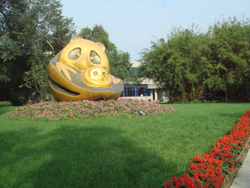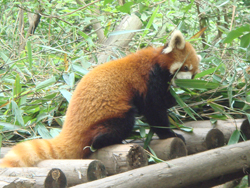12th July 2009
 Panda
and Cub model at the entrance to the Panda Research Centre
Panda
and Cub model at the entrance to the Panda Research Centre An early start this morning for the Chengdu Panda Research and Breeding Centre. Established in Chengdu to research into Panda breeding after many Pandas died of starvation in 1980's, the Research Centre has become an important research centre and popular destination for visitors to Chengdu.
The Research Centre is most famously home to the Giant Panda (sweeeeeeet!) but also to the Red Panda - so the best time to visit is the morning, preferably before 10am, as they goto sleep after feeding and when the temperature gets too much for them (over 24 degrees centigrade)
 Two
cubs fooling around
Two
cubs fooling around
 Red
Panda feeding on foliage
Red
Panda feeding on foliage There's also a small museum dedicated to the Pandas which didn't take us too long to get around.
The Pandas, especially the cubs, are cute. But do get there early to make the most of the centre.







